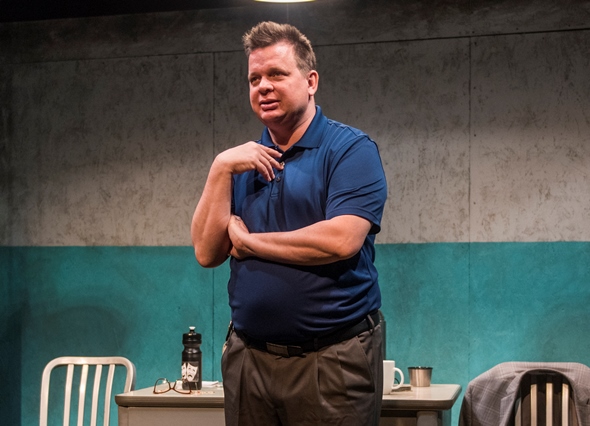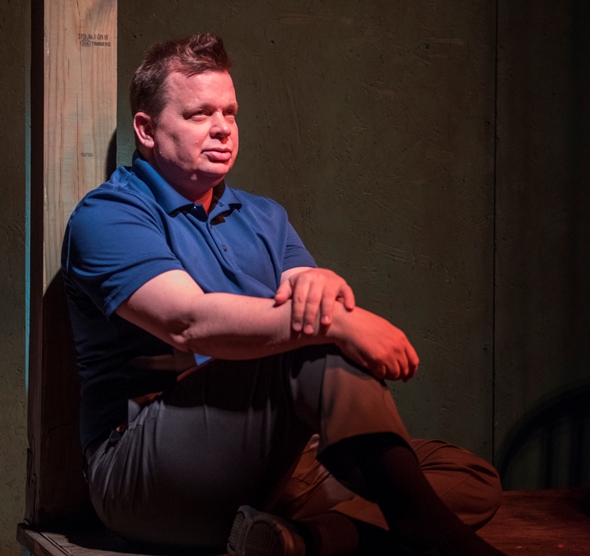‘The Absolute Brightness of Leonard Pelkey’: Charismatic gay boy, sundry friends, one actor

Joe Foust plays all the roles in “The Absolute Brightness of Leonard Pelkey,” produced by American Blues Theater at Theatre Wit. (Production photos by Michael Brosilow)
“The Absolute Brightness of Leonard Pelkey” by James Lecesne, directed by Kurt Johns at American Blues Theater through April 27. ★★★★
By Lawrence B. Johnson
What’s so seductively marvelous about Joe Foust’s one-man turn through James Lecesne’s bittersweet play “The Absolute Brightness of Leonard Pelkey,” currently in production at American Blues Theater, is not simply the actor’s ability to sustain a complicated narrative alone on the stage. What’s absolutely magical is Foust’s blink-of-an-eye transformations from one fully formed character into another, each new persona as distinctive, empathic and credible as the last.
In the beginning, Foust appears before us as a seasoned, one might say weathered, detective, musing on the humdrum, the grittiness and the necessity of the work to which he has devoted his life. (His shabby office, designed by Grant Sabin, bears witness to years of earthy labor.) He quotes a bit of Shakespeare, noting with a proud, wide smile that you’re probably surprised a Jersey cop could quote the Bard. Pretty soon, he gets around to the story he wants to tell, about this kid Leonard Pelkey, 14 years old – a really different and interesting kid, a gay kid who embraced life with his whole heart and whose optimistic example touched everyone who knew him. One day, Leonard Pelkey just disappeared. Turns out he was brutally murdered. The cop’s story is about his investigation and how the killer was revealed.
Leonard was flamboyantly gay. He fashioned rainbow-striped platform soles for his sneakers. There were those who, out of concern for his safety, urged him to rein it in a bit; but that wasn’t Leonard. He just laid it all out there. He was going to be himself, to the hilt. And the world would just have to accept the whole package. Truth is, Leonard’s authenticity – like his unwavering positivism – was infectious. The kid made an impression on you. The cop got that from everyone. But Leonard was more than sweetly unusual; he was thoughtful and helpful. He changed people.
Though we never meet Leonard, we get to know a raft of townspeople who had a pretty good sense of him and together provided the detective with a fully fleshed out picture of a remarkable boy who deserved better than life handed him.
Foust defines them all, the women as well as the men, even a shy girl about Leonard’s own age. One woman is a gossipy hairdresser who adored Leonard and recalls constantly prevailing upon him to go easy on the gay stuff. Foust nails the woman’s posture, her gestures, turns of phrase, accent. And in a twinkling, he brings the same easy certitude to her daughter, a deferential girl who lives under her mother’s thumb. The girl knew Leonard and, of course, liked him. She was not one of the pretty, popular girls at school, but Leonard paid attention to her.
Like Foust’s fluent impersonations of female characters, each of his men comes wrapped in ringing veracity. There’s the elderly German (maybe Swiss) owner of a watch shop whose account of Leonard is muttered through a thick accent. He recalls how Leonard was actually drawn to a real watch, with gears and hands, not some digital contrivance that forsakes the traditional craft of watch-making. Most people have forgotten what a truly beautiful timepiece looks like. But Leonard had the genuine article, a pocket watch.
Perhaps the person who knew Leonard best was the Brit who ran the local drama school. If the keeper of the watch shop takes us miles from Foust’s cop in one direction, the British acting coach dwells just as far off down the opposite path. Foust’s Brit – who recalls having to overcome initial fears that his new school was the lair of a pedophile – speaks with a trained actor’s eloquence, but also with the compassion of a man who liked and admired and marveled at this most remarkable boy.
We never meet Leonard’s killer, but – with the cop – we discover who he is, through the feverish testimony of a lonely girl who thought someone finally had taken an interest in her. That may be Foust’s masterstroke: the confusion, anxiety and disillusionment of an adolescent girl who is able to open up to a cop, to convey what she has witnessed clearly. To be real. Like Leonard Pelkey.
Related Link:
- Performance location, dates and times: Details at TheatreInChicago.com



